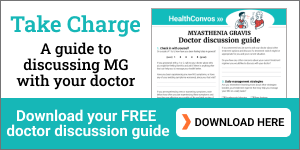Myasthenia gravis support groups and resources
Last updated Nov. 19, 2024, by Agate Boxe

Myasthenia gravis (MG) support groups can provide you with a sense of community and emotional support, as well as be a place to share advice and learn about other MG resources.
MG is a rare neuromuscular disease whose symptoms include muscle weakness, fatigue, droopy eyelids, and slurred speech.
Having a strong support network — especially local support groups if available — and online resources can help you navigate living with myasthenia gravis.
Support groups
Joining an MG support group — in person or virtually — can be a way to find camaraderie and connection through shared experiences. You may get advice from people with the condition about ways to cope with the challenges.
National and international organizations offer support groups for people with MG — some specifically for children and young adults — their family, and caregivers.
MG support groups in the U.S. include:
- The Myasthenia Gravis Foundation of America
- The Myasthenia Gravis Association
- Conquer Myasthenia Gravis
- Myasthenia Gravis Minnesota
- The Myasthenia Gravis Foundation of Michigan.
MG support groups outside the U.S. include:
Online support
For many people with MG, having online support can be invaluable, especially for emotional support.
Connecting with a peer who has an MG diagnosis via Facebook chat or an Instagram message can make a difference when you are finding it difficult, physically or emotionally.
Myasthenia Gravis News has a number of forums dedicated to MG mental health, and managing your professional life and relationships, among other topics. It also has a Facebook page covering several topics and news.
Other Facebook groups include:
Financial resources
Living with a chronic disease like MG can be financially challenging. Expenses often include medications, disease treatments, medical care, and insurance. As the disease progresses, you may need additional support such as speech therapy, mobility aids, and caregiving assistance.
According to survey data presented at the MDA Engage Virtual MG Symposium, held in October 2022, an average of almost $16,000 per year were paid by families as out-of-pocket healthcare costs related to MG.
There are organizations that offer different types of financial assistance for expenses related to MG.
- The Assistance Fund, a charitable organization that helps people cover medical out-of-pocket costs, offers practical support by providing assistance paying for some prescription medications for MG.
- The PAN Foundation offers up to $6,200 in treatment assistance per year, including covering some medications.
- The National Organization for Rare Disorders (NORD) provides financial assistance for medications, diagnostic tests, and travel assistance to participate in clinical trials of treatments for MG.
- Conquer Myasthenia Gravis can provide up to $1,000 per year to residents of Illinois, Indiana, and Wisconsin who have the disease to cover the costs of medication, medical treatment, and at-home medical equipment such as mobility aids.
Other options:
- Some pharmaceutical companies offer copay assistance programs for approved MG treatments.
- State Pharmacy Assistance Programs, which are available in many states, may offer help with paying for prescription medications.
Educational support
Your MG healthcare team should always be your primary source of information for living with MG. But other myasthenia gravis resources, such as forums, webinars, and podcasts, can be another way to learn more about the disease.
They can provide information on MG research, strategies to raise awareness of the disease, and advice on addressing challenges related to mental health. Research shows that people with MG may be more likely to experience symptoms of depression than people without the disease, so taking care of your mental well-being is key.
You can stay up to date with the latest treatments — including experimental treatments — and other developments on Myasthenia Gravis News. It has articles, columns, news stories, and videos about MG.
The Myasthenia Gravis Foundation of America’s YouTube channel lists webinars on the latest research developments related to treatment and other topics such as wellness.
Martine Hackett, an associate professor of public health at Hofstra University, runs a podcast, Untold Stories: Life with a Severe Autoimmune Condition, where she interviews people living with chronic diseases, including MG.
Useful information for people with MG
Building a knowledgeable, collaborative, and empathetic care team is essential for treating all aspects of living with MG.
Your team may include:
- a neurologist or doctor who treats disorders of the nervous system and who may refer you to other specialists
- a neuromuscular specialist — a doctor with specific training in neuromuscular disorders such as MG
- an ophthalmologist to help you address potential symptoms affecting the eyes and vision
- a thoracic surgeon if you require a thymectomy or removal of the thymus
- a speech therapist to help you address potential speech, communication, and swallowing issues
- a nutritionist to adjust your diet if needed, especially if you experience swallowing issues
- a physical therapist to create a safe exercise program
- an occupational therapist to help you more easily navigate daily activities such as getting in and out of the car
- a mental health expert for MG mental health issues.
To find an MG provider, ask your primary care physician, check with your insurance company, or with a local MG organization. You can also try using the Myasthenia Gravis Foundation of America’s search tool for finding a doctor.
Always speak with your doctor when you have questions about potential new treatments and contact them if symptoms change or worsen.
Myasthenia Gravis News is strictly a news and information website about the disease. It does not provide medical advice, diagnosis, or treatment. This content is not intended to be a substitute for professional medical advice, diagnosis or treatment. Always seek the advice of your physician or other qualified health provider with any questions you may have regarding a medical condition. Never disregard professional medical advice or delay in seeking it because of something you have read on this website.
Recent Posts
- How my twin with MG has learned to process anger over the years
- Overweight MG patients at greater risk of disease worsening: Study
- After decades with MG, I finally know what I want from others
- Why empathy is important in a patient-provider relationship
- Switch to Zilbrysq for gMG found safe, effective in clinical trial
Related articles







